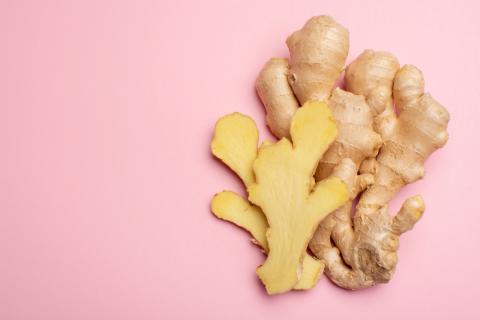
If you like to cook, drink tea, or simply enjoy a variety of tastes for your sophisticated palate, you have undoubtedly used ginger at some point in your diet in several different ways. Available for ingestion as a fresh root, a powder, a whole leaf, and even pills, ginger has played a large role in kitchens and medicinaries for centuries all over the world.
Originating in Southeast Asia, ginger root or Zingiber officinale has been touted as a home remedy for nausea and vomiting resulting from chemotherapy or pregnancy. However, the studies to substantiate these claims have been primarily empirically based with very little consistent results in clinical trials.
Unlike turmeric root or Curcuma longa, which is in the same family, ginger, which is said to reduce inflammation, does not even provide strong evidence for its anti-inflammatory role in joint health and arthritis.
So why all the excitement around ginger? And what is its true efficacy on health?
In Ayurvedic medicine, we look at the function of medicinal herbs and spices from an energetics perspective. In other words, Ayurveda uses the medicinal application of plants and how they are systematically related based on their physical and energetic properties including the elements, tastes, thermodynamics, digestive effects, and other special potencies they possess. Ayurveda starts by examining the taste of spice (Rasa), the quality and temperature (Virya), and its effect on the digestion system (Vipak).
Rasa (Taste)
Fresh ginger is pungent to the taste, but if it is taken in a powder form, it can be slightly sweet as well. This allows constitutions that are sensitive to spice to receive the benefits of its digestive aid without aggravating their taste buds.
Virya (Quality)
The qualities of ginger are heating and stimulating, and if taken in a powder form, it can be drying as well. Recognizing which form of ginger to consume can be helpful for understanding its application in wet (mucus) or dry related disorders.
Vipak (Digestive Effect)
The digestive effects of ginger are quite remarkable. Because of its pungent quality, ginger can stimulate the production of digestive enzymes while simultaneously decreasing the likelihood of acid flowing from your stomach into your esophagus. This is because its phenolic compounds are said to relieve gastrointestinal irritation and lessen gastric contractions.
The compounding effects of ginger on the digestion can aid with many other disorders in the body according to Ayurveda. By healing the digestion, the body can then learn to assimilate foods differently, aid in the production of enzymes and hormones, and stimulate the other organs for bile production and the proper release of excrements in the channels. This, in turn, can lead to a reduction of inflammation in the body.
Conclusion
Although there are no clear-cut evidence-based studies to show exactly how ginger can cure ailments, Ayurveda’s fundamental approach in using plants as medicine is that the individual person as a whole is who advocates the use of herbs instead of isolating, extracting, and administering active ingredients. Ayurveda supports the synergistic approach as opposed to the reductionist approach to studying physiology, nature, or herbs. Whether ginger soothes the digestion, alleviates nausea, or simply tastes good, the true test of the spice is in the results received by the partaker.








